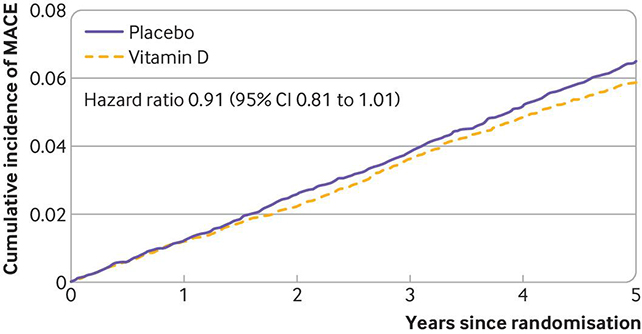We know that vitamin D is good for our bodies, but whether or not taking it as a supplement on top of a diet has any real health benefits has long been debated. The latest study on the issue suggests that such supplements can reduce heart attack risk.
While the research only reports a small swing in the risk of a "major cardiovascular event" when taking vitamin D, it's certainly helpful in figuring out the relationship between these and other health factors.
It's the second-largest study yet to look at vitamin D supplements and cardiovascular disease risk, according to the study's lead author, epidemiologist Rachel Neale from the QIMR Berghofer Medical Research Institute in Australia.
File this as a study that isn't conclusive in terms of cause and effect but has a large enough sample size – 21,302 patients aged between 60 and 84 – to mean that more work can now be done to analyze the relationship in more detail.
"Our trial found vitamin D supplementation may reduce the risk of major cardiovascular events, and the protective effect could be more marked in those taking statins and other heart disease drugs," says Neale.
"It does suggest that further research into this is needed."
The study participants were given either a vitamin D supplement or a placebo for up to five years, with around 80 percent of those in the vitamin D group still taking their supplements at the end of those five years.
In the vitamin D group, 6 percent of participants experienced a major cardiovascular event, compared to 6.6 percent of participants taking a placebo. In terms of heart attacks specifically, the rate was 19 percent lower in the vitamin D group, whereas there was no difference in the rate of stroke.

The stats showed a greater benefit from vitamin D supplements for those on statins or some other form of heart health drug when the trial started – another interesting finding to explore further.
"We're not sure why this is the case," says Neale. "It could be an indicator of a higher risk at the start of the trial, so there was more scope for improvement."
The researchers are keen to point out that no one should start popping vitamin D supplements for their heart without first consulting a doctor – especially older people with existing conditions.
Meanwhile, the debate about supplements continues. If you're interested in boosting vitamin D more naturally, the answer is plenty of sunlight and foods, including oily fish and egg yolks.
"While previous randomized controlled trials have not found that taking supplements is beneficial for this outcome, the findings of the D-Health Trial suggests it is premature to say vitamin D supplementation does not alter the risk," says Neale.
The research has been published in the BMJ.
